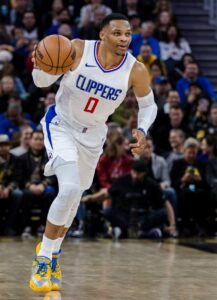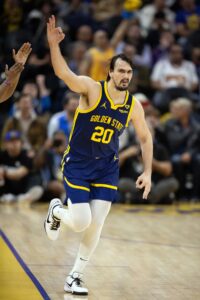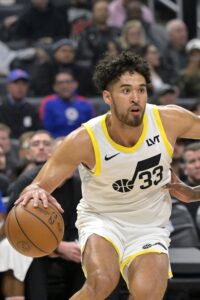Now that the Jazz have used up their cap room by renegotiating Lauri Markkanen‘s contract and completing a series of minor signings, only one NBA team is still operating under the cap: Detroit.
The Pistons currently have a team salary of $130,348,501, giving them $10,239,499 in space below the cap ($140,588,000). They could increase that figure to nearly $18MM by waiving Paul Reed‘s non-guaranteed $7,723,000 salary, though there’s no indication they plan to do so.
With 14 players on standard contracts, the Pistons have an opening on their projected 15-man regular season roster for 2024/25 and could – in theory – make an aggressive offer to a free agent using their remaining cap room. But the unrestricted free agents who remain unsigned will likely end up on minimum-salary deals or something very close to it, so Detroit is unlikely to make a $10MM offer to any of them.
The lone standard restricted free agent, forward Isaac Okoro, makes sense as a target, given his age, defensive pedigree, and familiarity with new head coach J.B. Bickerstaff, who coached him in Cleveland. But there haven’t been any hints that the Pistons are considering an offer sheet for Okoro, and they’d probably have to waive Reed to put together an offer strong enough to dissuade the Cavs from matching.
In all likelihood, the Pistons will simply hold their remaining cap space open for now, keeping an eye on the trade market for opportunities that could net them additional assets, like their previous deals for Tim Hardaway Jr. and Wendell Moore.
In past years, it wasn’t unusual for teams to hold significant chunks of cap room open into the regular season, knowing they could use that space at the trade deadline to accommodate salary-dump deals. But the new CBA requires teams to spend up to at least the minimum salary floor before opening night — if they don’t, they lose that cap room and make themselves ineligible to receive the end-of-season payout from taxpaying teams. That’s likely one reason why the league-wide cap room has dried up so early in the year.
The minimum salary floor is $126.5MM this season, so the Pistons have surpassed that threshold.
While the Pistons are the only team with cap room available, clubs operating over the cap and well below the luxury tax line still have a good deal of flexibility to take on extra salary in trades due to the more generous salary-matching rules in the current CBA.
Those rules allow teams below the first tax apron to take back up to 200% of their outgoing salary (plus $250K) for any amount up to $7.5MM; the outgoing salary plus $7.5MM for any amount between $7.5MM and $29MM; and 125% of the outgoing salary (plus $250K) for any amount above $29MM.
For instance, if the Jazz were to trade Jordan Clarkson and his $14,092,577 salary, they could take back up to $21,592,577 (Clarkson’s salary, plus $7.5MM). By comparison, if the Pistons were to trade Hardaway ($16,193,183), they could take back up to $26,682,682 using their leftover cap room. That cap room certainly gives Detroit more financial flexibility in trade talks, but not necessarily significantly more.


 Losing Caldwell-Pope allowed the Nuggets to free up their taxpayer mid-level exception, which they used to sign stretch forward/center
Losing Caldwell-Pope allowed the Nuggets to free up their taxpayer mid-level exception, which they used to sign stretch forward/center  JULY 12: The Jazz are re-signing restricted free agent
JULY 12: The Jazz are re-signing restricted free agent